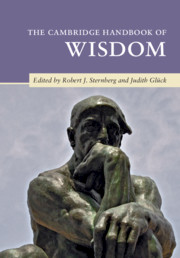Book contents
- The Cambridge Handbook of Wisdom
- The Cambridge Handbook of Wisdom
- Copyright page
- Dedication
- Contents
- Figures
- Tables
- Contributors
- Preface
- Part I Foundations of Wisdom
- 1 Race to Samarra
- 2 Philosophical Foundations of Wisdom
- 3 Sociocultural Foundations of Wisdom
- 4 Neurobiology of Wisdom
- Part II Conceptions of Wisdom
- Part III Measures of Wisdom
- Part IV The Development of Wisdom
- Part V Cultural Perspectives on Wisdom
- Part VI Wisdom and Other Psychological Constructs
- Part VII Wisdom in Action
- Part VIII Conclusions
- Index
- References
2 - Philosophical Foundations of Wisdom
from Part I - Foundations of Wisdom
Published online by Cambridge University Press: 15 March 2019
- The Cambridge Handbook of Wisdom
- The Cambridge Handbook of Wisdom
- Copyright page
- Dedication
- Contents
- Figures
- Tables
- Contributors
- Preface
- Part I Foundations of Wisdom
- 1 Race to Samarra
- 2 Philosophical Foundations of Wisdom
- 3 Sociocultural Foundations of Wisdom
- 4 Neurobiology of Wisdom
- Part II Conceptions of Wisdom
- Part III Measures of Wisdom
- Part IV The Development of Wisdom
- Part V Cultural Perspectives on Wisdom
- Part VI Wisdom and Other Psychological Constructs
- Part VII Wisdom in Action
- Part VIII Conclusions
- Index
- References
Summary
- Type
- Chapter
- Information
- The Cambridge Handbook of Wisdom , pp. 10 - 39Publisher: Cambridge University PressPrint publication year: 2019
References
- 19
- Cited by



